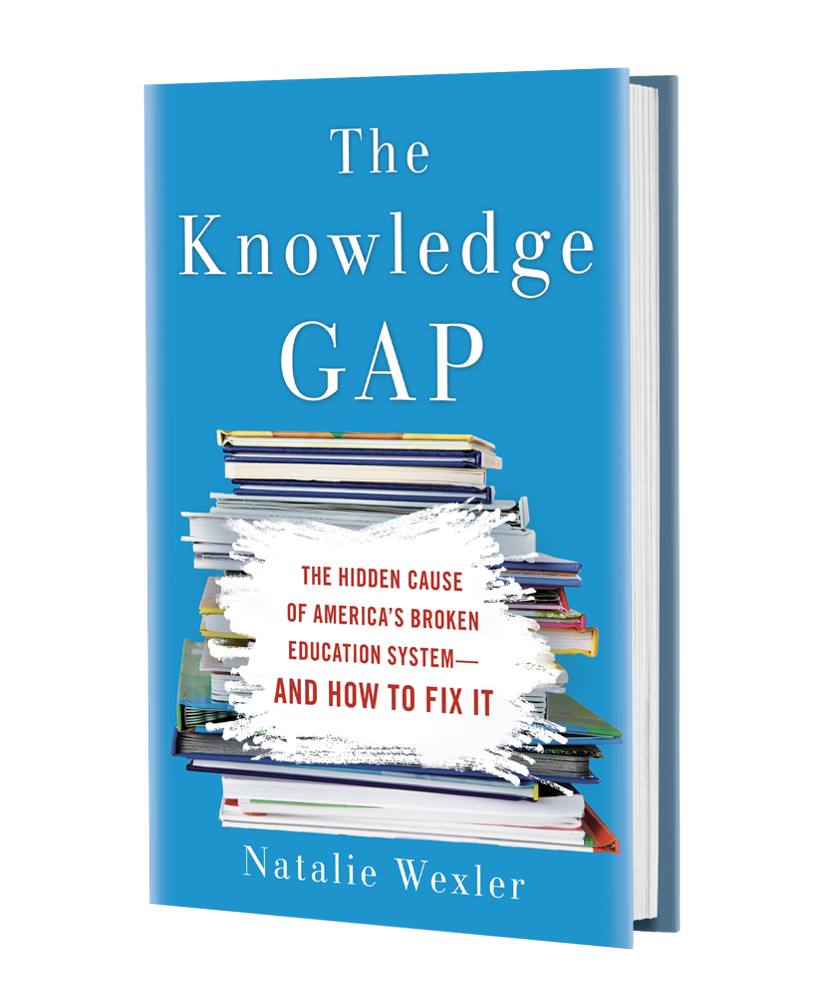Not many people dare to have brutally honest exchanges with philanthropic foundations, but former education commissioner in Rhode Island, Ken Wagner, sure did. As transcribed in journalist Natalie Wexler's powerful new book, The Knowledge Gap, Wagner had a conversation in 2016 with Gates' newly-appointed director of K-12, Bob Hughes, saying "Gates has screwed up a lot of things, but one thing they've done really well is mosquito nets," referring to Gates' life-altering investments in Africa. Advised Wagner, "We need a mosquito net for education and curriculum is it. It will save lives."
So Wexler sets out to make the case for the critical importance of a knowledge-rich curriculum, one that could save lives, level the playing field between kids growing up in poverty and their more affluent peers, reinvigorate classrooms, and produce a nation of readers united by shared knowledge. She does so remarkably successfully on a number of levels, no matter whether one comes at this issue as a classroom teacher, a foundation program officer, a policymaker—or merely someone who loves the real back stories, featuring policy notables such as Lynn Cheney, David Coleman, and Diane Ravitch. This is a must-read book, a journalistic tour de force no less important than Amanda Ripley's The Smartest Kids in the World.
Long a staunch proponent of accountability and student testing, I am now less so as a result of this book. Wexler is able to draw a pretty straight line from NCLB's emphasis on reading to schools abandoning science and history, meaning that reading became a skills-based enterprise and not a vehicle for building knowledge. While Wexler is able to cite statistics that science and history are now getting fewer than 20 minutes in a school day, my guess is that the actual number is far lower, given what schools misconstrue as legitimate content (e.g. 'Families and Schools', 'Myself and Others' are common, though vapid, social studies topics), believing that kids won't be interested in anything that isn't about them.
I'll concede that NCLB may indeed be a watershed moment, but science, good children's literature, and history were already on life support well before 2001. Still, Wexler has me wondering if we ought not just to throw out every state's ELA test until we can agree that they are not just pointless, but harmful to kids until we have the guts to link them to a knowledge-rich curriculum.
Though Wexler doesn't dive too deeply into how teacher training institutions play into this issue, it's clear in her many examples from classrooms and teacher interviews that someone (if not prep programs, who else?) has seriously misled teachers about the job of teaching. The misconception is that by virtue of having acquired a teacher license, they then have the skills to create an effective and coherent curriculum. One of the more fascinating untold stories in the book is about an actual curriculum developer, the uber-popular but reading-science-denier Lucy Calkins. On Calkins, Wexler pulls no punches. Once just a prominent voice for 'balanced literacy,' Calkins found herself in a position of having to write an actual curriculum in three weeks after former New York City schools Chancellor Joel Klein announced to the world that Calkins' reading methods would be used in all classrooms across the city, a decision which not only did not advance kids but which Klein later said was his worst decision during his tenure.
One of the reasons I like Wexler's book so much is her persistence, digging for examples of good work and schools that understand that by delaying the introduction of any content until high school, they shoot themselves (and the kids in their charge) in the foot. Louisiana is a state whose leadership just seems to 'get it' and is prominently featured. There continue to be Core Knowledge devotees in hundreds of schools, along with big urban districts like my home town of Baltimore (and Wexler's, as it happens) and some school districts in Tennessee under the auspices of the LIFT network. Wexler can't find many, but these places may be some of the first to inoculate American kids from a scourge in our society comparable to malaria-ridden sub-Saharan Africa.

